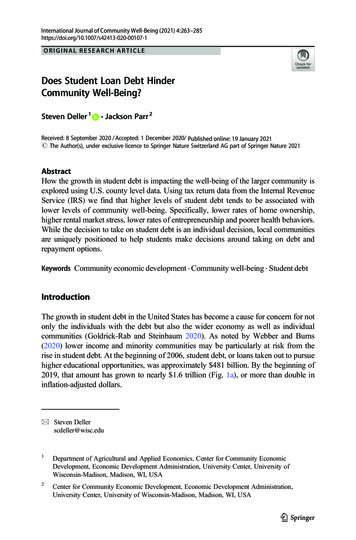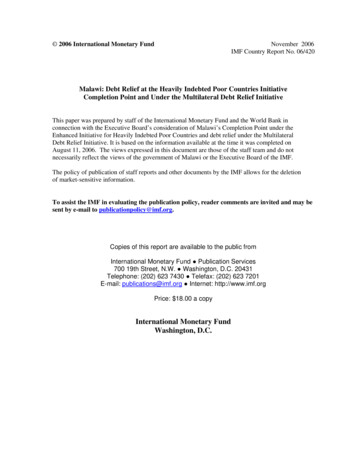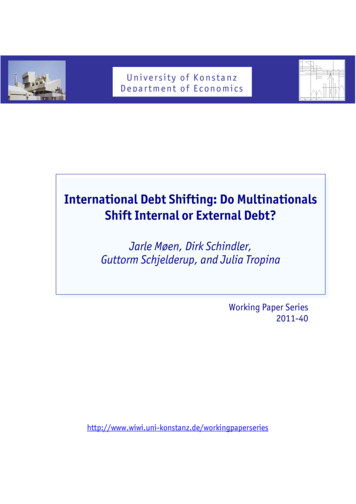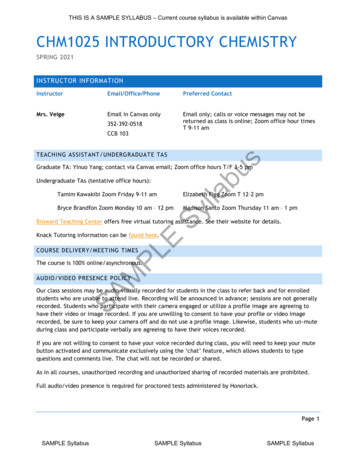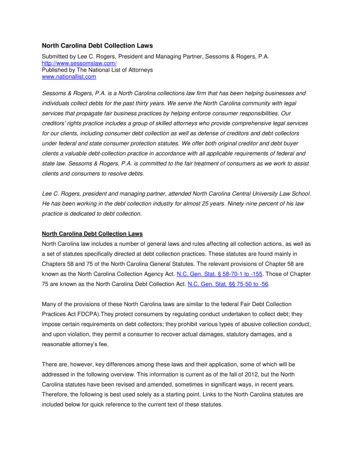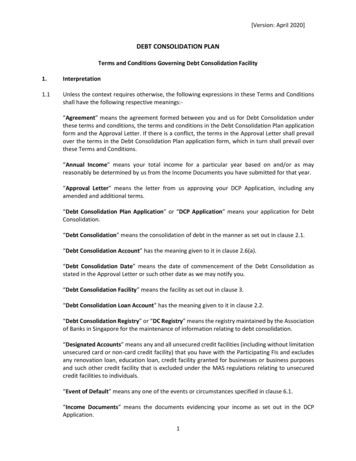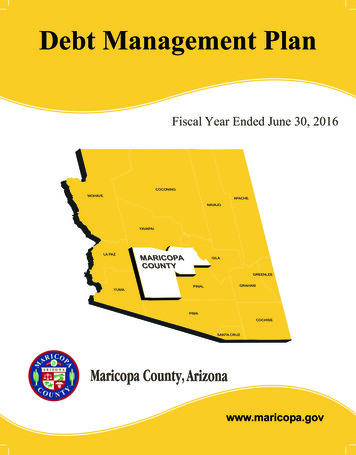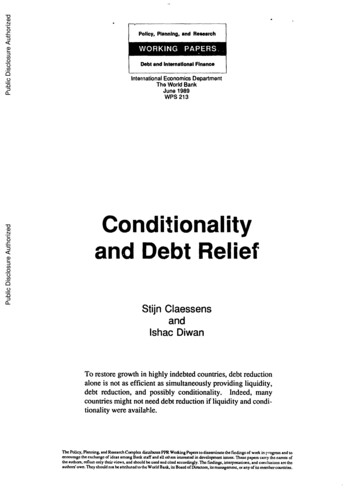
Transcription
Money and Debt Advice Syllabus Chartered Institute of Credit Management 201809.02.2018All rights reserved; no part of this publication may be reproduced, stored in a retrieval system, or transmitted in any form or by anymeans, electronic, mechanical, photocopying, recording or otherwise without prior permission of the Chartered Institute of CreditManagement. This publication may not be lent, resold, hired out or otherwise disposed of by way of trade in any form of binding orcover other than that in which it is published, without prior consent of the Chartered Institute of Credit Management.1
Money and Debt Advice SyllabusContentsCICM Qualifications in Money and Debt AdviceCICM Professional Qualifications3CICM unit awards, certificates and diplomas4Rules of combination5Level of qualification and assessment5Study support7Arrangements for reasonable adjustments7Recognition of prior learning7Grading, results and certification7Registration with CICM7CPD and FAQs8General Money and Debt Advice10Principles and PracticeDebt Prioritisation and Collections Process Advice18Principles and PracticeMoney and Debt Advice Call Handling26Principles and PracticeNon-Statutory Debt Solutions and Budgeting Advice34Principles and PracticeCourt Procedures and Enforcement Advice42Principles and PracticeStatutory Debt Solutions Advice49Principles and PracticeAppendix A: MAS Quality Framework for Individuals NOS Grid53Appendix B: MAS Initial contact and support activity list55Appendix C: MAS General advice activity list60Useful contacts672
Money and Debt Advice SyllabusCICM qualifications in money and debt adviceCICM Professional QualificationsThe Chartered Institute of Credit Management has awarded qualifications since 1949 andwas the first organisation to be directly recognised by the Office of Qualifications andExamination Regulations (Ofqual) to design, deliver and award qualifications in creditmanagement related areas.CICM professional qualifications are suites of nationally recognised units and qualificationswhich range from Level 2 to Level 5 and provide a benchmark for the credit, collections, debtadvice and enforcement areas of work. CICM qualifications are internationally recognisedand Ofqual regulated. The flexible structure gives the opportunity to build qualifications tosuit roles and career ambitions and to move easily between qualifications.Learners can either take a single CICM unit award or build credit for a CICM Certificate orDiploma through completion of a selection of units. Also learners can transfer creditbetween levels and from other relevant qualifications.Money Advice Service recognitionCICM Money and Debt Advice qualifications have achieved accreditation against the MoneyAdvice Service (MAS) Quality Framework for Initial Contact, Support Work and Advice Work.This means that learners who achieve these qualifications will have met recognisedbenchmark standards for the debt advice industry.CICM Money and Debt Advice qualifications are open to all and include a range of units whichvary in size from three to four credits (one credit represents ten learning hours). The unitslink to the National Occupational Standards (NOS) in the Money Advice Service (MAS)Quality Framework for individuals delivering debt advice (see Appendix A). Learners cancomplete any number of units in any order, although the Institute recommends specificpathways for learners who work in initial contact and support work or advice work (seebelow and Appendices B & C).Debt activityPrinciples & practice units:Initial contact General money and debt adviceSupport work General money and debt adviceDebt prioritisation & collections processMoney and debt advice call handling General money and debt adviceDebt prioritisation & collections processMoney and debt advice call handlingCourt procedures and enforcement adviceStatutory debt solutions adviceNon-statutory debt solutions andbudgeting adviceAdvice workQualification titleCICM Level 2 or Level 3Certificate in Money andDebt AdviceCICM Level 3 Diplomain Money and DebtAdvice3
Money and Debt Advice SyllabusLearners who pass the CICM Level 2 or Level 3 Award in General Money and Debt Advice willbe qualified for initial contact work. The Level 2 or Level 3 Certificate in Money and DebtAdvice covers the knowledge and skills required for support work and the Level 3 Diploma inMoney and Debt Advice supports advice work. See CICM website for further details.Please note that MAS recommended learning for case work, specialist or court representationwork are outside the scope of these qualifications.Each unit award is individually certificated and requires between two and three months oflearning and successful completion of an assignment. A CICM Certificate for initial contactand support work takes six to twelve months to complete and a CICM Diploma for generaldebt advice work about two years, depending on the number of units a learner takes at onetime and the amount of credits transferred from other qualifications.Awards in Money and Debt Advice : Level 2 and Level 3 unit awards demonstrate knowledgeand skills in a specific area of money and debt advice. In particular, CICM recommends thegeneral money and debt advice unit for initial contact and support work.Following successful completion of an assignment, learners gain a unit certificate and credittowards certificates and diplomas in money and debt advice, and other CICM qualifications,for example in credit management. CICM unit awards are designed for people working indebt advice, counselling, credit management, collections, debt management and supportroles within the money and debt advice sector. They are also useful for people for whommoney and debt advice forms a small part of their role.Certificates in Money and Debt Advice:Level 2 and Level 3 Certificates in Money and Debt Advice demonstrate knowledge and skillsin a range of money and debt advice areas. Learners need to accumulate at least 19 creditsincluding a minimum of 9 credits from money and debt advice principles units and 10 creditsfrom money and debt advice practice units.The certificate qualification establishes the level of competency for support work such asdebt customer service advisors. The previous table shows three sets of units which matchthe requirements of the MAS Quality Framework: general money and debt advice; debtprioritisation and collections advice; and money and debt advice call handling.Diplomas in Money and Debt AdviceLevel 2 and Level 3 Diplomas in Money and Debt Advice demonstrate expertise and detailedknowledge in money and debt advice. Learners need to accumulate at least 37 creditsincluding a minimum of 20 credits from money and debt advice principles units and 10credits from money and debt advice practice units.The Level 3 Diploma establishes the level of competency required for general debt adviceroles such as money and debt advisors on the MAS Quality FrameworkRules of combination for Money and Debt Advice qualificationsThe table below summarises rules of combination for the qualification. There is someflexibility because learners can include credit from the level below (up to 7 credits in theCertificate; 15 credits in the Diploma).4
Money and Debt Advice SyllabusFor example, a learner could count credit from a Level 2 pass in debt prioritisation andcollections process advice towards the CICM Level 3 Diploma in Money and Debt Advice.Also, learners could include up to 7 credits from other business, administration and financequalifications, such as customer service, advice work or counselling. The Chartered Instituteencourages learners to get in touch with the CICM Awarding Body to discuss options and anyassociated fees - see back page for contact details.Total creditTotalQualificationTimePrinciplesunits (mincredit)Max L2Practice units credit(min credit)towards L3qualificationMax creditfrom otherrelevantunits/qualificationsCICMCertificate 1920491070CICM Diploma 374182010157Level of qualificationThe level of final qualification will depend on the level of units that are passed. For example,the CICM Awarding Body will automatically award a Level 3 Diploma in Money and DebtAdvice on achievement of at least 37 credits at Level 3. Level 2 achievement demonstratesgeneral knowledge and skills. Level 3 achievement demonstrates in-depth knowledge andexpertise.All units are assessed at multiple levels and therefore learners do not need to decidewhether to start at Level 2 or Level 3. However, the CICM can provide a Level 2 assignmentif preferred. Level 2 and Level 3 learners study from the same learning materials and resultsdepend on the level of response in the assignment.This document gives details about units associated with the following qualifications: CICM Level 2 & 3 Certificates in Money and Debt Advice 501/1647/2 : 501/1646/0CICM Level 2 and 3 Diplomas in Money and Debt Advice 501/1505/4 : 501/1721/XVisit www.cicm.com for the content of CICM certificates and diplomas in credit managementand debt collection.AssessmentThe CICM assesses each unit centrally with an assignment and therefore candidates do notneed to work for an organisation which is a CICM assessment centre in order to access thequalification. However, the Chartered Institute can tailor assessment to suit individualorganisational requirements if required. Assessment is available in the English language.Candidates pay as they go for each assessment (see www.cicm.com for current CICMregistration and assessment fees).Generally candidates submit one assignment which covers both related principles andpractice units (for one assessment fee per assignment). However if a candidate is unable toevidence the practice unit, they could submit an assignment which covers only the principlessection (same fee applies).5
Money and Debt Advice SyllabusEach assignment has a mark scheme and the Institute expects answers to be consistent withthe relevant National Occupational Standards (NOS) and activities specified in the MASFramework for Individuals (MAS 2013: Appendices 1 - 3)1 – see summaries in appendices A, Band C. In order to support candidates with this requirement, the Chartered Institute publishesrelevant NOS on the Chartered Institute’s website: www.cicm.com.However please note that CICM qualifications do not involve NVQ-style assessment wherecandidates supply portfolios of evidence to show how they meet NOS criteria. Instead theChartered Institute expects candidates to demonstrate their knowledge and skills by conciseanswers to assignment questions. As a result there are strict limits to the number of appendicesincluded in assignments (see advice at the start of assignments and in the assignment guidancebooklet).Money and Debt Advice PathwayInitial ContactAward in GeneralMoney and DebtAdviceGeneral Money and Debt Advice*standard award is Level 3 butLevel 2 may be awarded whererequired standard not achievedVSupport WorkESSENTIAL SKILLSCertificate inMoney and DebtAdvice*standard award is Level 3 butLevel 2 may be awarded whererequired standard not achievedGeneral Money and Debt AdviceDebt Prioritisation and Collections Process AdviceMoney and Debt Advice Call HandlingVDebt Advice WorkCourt procedures and enforcement adviceADVANCED SKILLSDiploma inMoney and DebtAdvice AICMStatutory debt solutions adviceNon-statutory debt solutions andbudgeting advice*standard award is Level 3 butLevel 2 may be awarded whererequired standard not achievedCase work, specialist or court representation work is outside the scope of these qualifications.1Visit www.moneyadviceservice.org.uk for more details.1
Money and Debt Advice SyllabusStudy supportCICM does not require candidates to complete a particular package of learning in orderto access the qualification. Learners can build their knowledge and skills in a range ofways, including their own in-company training. The MAS website details accreditedtraining available to support preparation for the qualifications. Also learners can topurchase a CICM study guide for the CICM Award in General Money and Debt Advice onAmazon.The Chartered Institute supplies a detailed mark scheme and an assignment guidancebooklet to support learners. In addition, CICM recommends that candidates work with acoach, who could be a line manager or trainer, to provide feedback on assignments andverify the authenticity of work - see CICM website for further details about studyoptions.Arrangements for reasonable adjustmentsThe CICM can make adjustments to assessments to ensure equality of opportunity andto enable a disabled learner to demonstrate his or her knowledge, skills orunderstanding. Please contact the CICM for the guidance booklet which explains how alearner qualifies for an adjustment and what adjustments can be made.Recognition of prior learning and qualificationsCICM has standard arrangements in place to recognise previous learning experience (seewww.cicm.com for more details). The Chartered Institute recognises relevant credit fromother awarding bodies, credit from other relevant or equivalent units, and can awardexemptions for relevant certificated prior learning.Results and certificationCandidates will receive a ‘Level 3 pass’, Level 2 pass’ or ‘fail’ grade for each unit,depending upon their level of achievement in the assessment. Candidates must achieveall learning outcomes to gain a pass. Because CICM units are assessed at multiple levels,if learners miss out, for example, on a pass at Level 3, they may gain a Level 2 pass.Additionally, for every unit candidates will receive a percentage. For the Certificate orDiploma qualification, there is no overall grade awarded.The CICM notifies grades in a results letter and candidates can access results online fromdates published on the website. Approximately six weeks later, candidates receive acertificate for unit passes and a final qualification certificate if they achieve the rules ofcombination for a CICM Certificate or Diploma.Registration with the CICMLearners are required to register with the CICM in order to take the Chartered Institute’sassessments because teaching centres do not handle this process. Fees are split intoregistration fees and assessment entry fees to enable the CICM to provide additionallearner support. The Chartered Institute has an open entry policy and to register,learners just need to complete and return a registration application form withappropriate fees. Contact CICM Awarding Body for information. Emailawardingbody@cicm.com or telephone 01780 722909. Study methods, resources,assessments and the Chartered Institute’s customer service policy and complaintsprocedure are explained on the CICM website www.cicm.com.1
Money and Debt Advice SyllabusCICM Professional Qualifications and MembershipOn registration with the CICM Awarding Body, learners automatically receive affiliatemembership of the Chartered Institute of Credit Management (non designatory grade).This provides a range of support (see website for details). On achievement of the Level 3Diploma, learners are eligible to Associate Membership (ACICM).Continuing Professional Development (CPD)Registration with the Chartered Institute gives access to the Chartered Institute’s CPDScheme (Progress). The simple to use scheme helps maximise the benefits of anycontinuing professional development. Also individuals or companies can submit CPDrecords annually to the Chartered Institute for certification. See www.cicm.com to findout more.Frequently asked questions (FAQs)Visit www.cicm.com and choose the FAQs tab to find answers to a wide range ofqualification related questions.2
Money and Debt Advice SyllabusMoney and Debt Advice unitsGeneral Money and Debt AdvicePrinciples4 creditsLevel 2 T/507/8939Level 3 K/507/8940Practice4 creditsLevel 2 D/507/0852Level 3 Y/507/0851Guided Learning Hours:32Total Qualification Time:80Debt Prioritisation and Collections Process AdvicePrinciples3 creditsLevel 2 K/507/0854Level 3 M/507/0855Practice3 creditsLevel 2 T/507/0856Level 3 A/507/0857Guided Learning Hours:32Total Qualification Time:62Money and Debt Advice Call HandlingPrinciples3 creditsLevel 2 F/507/0858Level 3 J/507/0859Practice3 creditsLevel 2 A/507/0860Level 3 J/507/0862Guided Learning Hours:32Total Qualification Time:62Non-Statutory Debt Solutions and Budgeting AdvicePrinciples3 creditsLevel 2 L/507/0863Level 3 R/507/0864Practice3 creditsLevel 2 Y/507/0865Level 3 D/507/0866Guided Learning Hours:32Total Qualification Time:62Court Procedures and Enforcement AdvicePrinciples4 creditsLevel 2 H/507/0867Level 3 K/507/0868Practice3 creditsLevel 2 M/507/0869Level 3 H/507/0870Guided Learning Hours:32Total Qualification Time:723
Money and Debt Advice SyllabusStatutory Debt Solutions AdvicePrinciples4 creditsLevel 2 K/507/0871Level 3 M/507/0872Practice4 creditsLevel 2 A/601/8641Level 3 T/507/0873Guided Learning Hours:32Total Qualification Time:804
Money and Debt Advice SyllabusGeneral Money and Debt AdvicePrinciples4 creditsLevel 2 T/507/8939 Level 3 K/507/8940AimThe unit aims to develop knowledge of how to provide general money and debt advice.Learning outcomesThe learner will:LEVEL 2 Assessment criteriaThe learner can:LEVEL 3 Assessment criteriaThe learner can:1.Understand how toestablish the cause andextent of personal debt1.1Describe common causesof personal debt.1.1Assess common causes ofpersonal debt.1.2Describe the importance ofestablishing the cause andextent of personal debt.1.2Explain why it is importantto establish the cause andextent of personal debt.Understand how to compilean effective budget.2.1Describe key components of 2.1an effective personalbudget.Explain key components ofan effective personalbudget.2.2Describe why householdexpenditure may be aboveor below average.2.2Assess reasons forhousehold expenditurebeing above or belowaverage.2.3Identify common priorityand non-priority debts.2.3Assess the priority ofcommon debts.2.4Identify ways that peoplecould maximise theirincome.2.4Assess ways that peoplecould maximise theirincome.2.5Identify ways that peoplecould reduce theirhousehold expenditure.2.5Assess ways that peoplecould reduce theirhousehold expenditure.2.3.Understand emergencysituations in relation tomoney and debt advice.3.1Identify emergencysituations when specialistadvice is required.3.1Explain emergencysituations in relation to debtand money advice.4.Understand how to offerappropriate money anddebt advice.4.1Describe how to handleinitial contacts to help arange of peopleunderstand and access thedebt advice service,including information aboutother specialist advicewhere appropriate.4.1Explain how to handleinitial contacts to help arange of people understandand access the debt adviceservice, includinginformation about otherspecialist advice whereappropriate.4.2Outline liability issues inrelation to personal debt.4.2Explain liability issues inrelation to personal debt.5
Money and Debt Advice Syllabus4.3Identify the main debtsolutions.4.3Explain a variety ofpossible solutions forpeople in debt.4.4Outline the importance ofmaintaining contact withcreditors.4.4Explain the importance ofmaintaining contact withcreditors.Indicative contentNOS Unit SFJIB11: First line money and debt legal adviceK1 Key areas of the legislative framework relating to consumer credit and debt in yourjurisdictionK3 The key components of a statement of income and expenditure, and:K3.1 Why it is important to prepare one with clientsK5 How to establish the extent and nature of clients’ debtK6 How the extent and nature of clients’ debt can affect the advice they are givenK8 What situations could constitute an emergency for clients in relation to their debtsand money managementK9 Types of emergency action that can be taken in particular circumstancesK11 Ways of maximising income and reducing expenditureK13 how to prioritise debts in terms of:K13.1 severity of creditor sanctionK13.2 potential client detrimentK14 How to develop and select strategies for addressing debt situationsK16 Alternative methods for dealing with debtK17 The importance of opening and continuing negotiations with creditorsK18 How to develop a strategy for dealing with creditorsNOS Unit SFJGA2: Support Clients to make use of the advice and guidanceservice Enable clients to decide whether to use the serviceK1 how to encourage clients to express themselves and their requirementsK2 what type of information should be obtained from the clientK3 what difficulties can occur when clients express their requirements and circumstancesK4 what information is available about the organisation and its serviceK5 what information is appropriate for difficult clientsK6 how to assess information to ensure that it is accurate andup to date k7 what types of format are suitable for differentclients K8 how to present different types of information toclientsK9 how to assist clients to decide whether their requirements can be met by the serviceK10 how to address any difficulties with the information providedK11 how to address different expectationsK12 what types of misunderstandings can occurK13 what are the advantages and disadvantages of using the service6
Money and Debt Advice SyllabusK14 what the consequences are of using the service for different clientsK15 which other services are availableK16 what is offered by other servicesK17 how to approach other services.Agree with clients their use of the serviceK18 how to clarify clients' needsK19 how to match clients' needs to the service being providedK20 why is it important to confirm clients’ needsK21 what the consequences are of not confirming the needsK22 what options for contact with the service are availableK23 how different clients may wish to use the serviceK24 what the procedures are for using the serviceK25 what actions could be taken for different needsK26 how to explain actions to clientsK27 what the systems for recording needs areK28 why it is important to use the systemsK29 what the procedures relating to the use of the systems areK30 what the relevant national, local, professional and organisational requirements arerelating to equal opportunities, discrimination, health and safety, security,confidentiality and data protectionK31 why it is important to comply with different requirementsK32 what the consequences are of not complying with different requirementsK33 how to obtain information on the requirementsIdentify and provide the information required by clientsK34 the types of information clients seek and the different reasons they have forseeking itK35 how to assess clients' needs and match them with current information sourcesK36 why it is important to confirm the information required.37 the different methods available for providing information and the different formatsthat can be used to present itK38 why it is important to agree that the information will be providedK39 what the systems for retrieving information are, and the procedures relating tothose systemsK40 why it is important to use the systemsK41 how to check clients' understanding of the informationK42 why it is important to check that the clients have received the informationmaterials they require and that they are sufficient and appropriate K43 What types ofproblem could occurK44 what actions can be taken to address themK45 why it is important to address problemsK46 what the implications are of not addressing the problemsK47 what other sources of information could help the clients and how these can beaccessedK48 what other activities might be necessaryK49 what the systems are for recording the provision of information and theprocedures relating to those systems7
Money and Debt Advice SyllabusK50 why it is important to use the systemsK51 which procedures relate to the use of the systemsGeneral Money and Debt AdvicePractice4 creditsLevel 2 D/507/0852Level 3 Y/507/0851AimThe unit aims to develop skills in general money and debt advice based on reflectivepractice.Learning outcomesThe learner will:LEVEL 2 Assessmentcriteria The learner can:LEVEL 3 Assessment criteriaThe learner can:1.1.1Gather information froma person to establishcurrent levels of incomeand expenditure.1.1Gather information toestablish current levels ofincome and expenditurein a range ofcircumstances.1.2Establish the nature andextent of personal debt.1.2Establish the nature andextent of personal debt ina range of circumstances.2.1Provide appropriateinitial information to helpa range of people decidewhether to use the debtadvice service inaccordance with legaland organisationalrequirements.2.1Provide appropriate initialinformation to help arange of people decidewhether to use the debtadvice service inaccordance with legal andorganisationalrequirements.2.2Agree people’s use of thedebt advice service,including reference toother specialist adviceorganisation.2.2Agree people’s use of thedebt advice service,including reference toother specialist adviceorganisations.2.3Help a person identifypotential ways ofmaximising income.2.3Help a range of peopleidentify potential ways ofmaximising income.2.4Help a person identifypotential ways ofreducing expenditure.2.4Help identify ways ofreducing expenditure in arange of personalcircumstances.2.5Help a person prioritisetheir debt.2.5Help a range of people toprioritise their debt.2.6Provide general advice on 2.6how to deal with personaldebt problems.Advise a range of peopleon how to deal with theirdebt.2.Be able to establish thecause and extent ofpersonal debt.Be able to provide moneyand debt advice.8
Money and Debt Advice Syllabus3Be able to reflect on3.1performance in relation togeneral money and debtadvice.3.2Assess own strengths and 3.1weaknesses in relation tomoney and debt advice inaccordance withorganisational policy.Evaluate ownperformance in relation tomoney and debt advice inaccordance withorganisational policy.Identify areas fordevelopment.Establish SMART goals forareas of development.3.2Indicative contentNOS Unit SFJIB11: First line money and debt legal adviceK1 Key areas of the legislative framework relating to consumer credit and debt in yourjurisdictionK2 Why it is important to gather information about clients’ circumstancesK5 How to establish the extent and nature of clients’ debtK6 How the extent and nature of clients’ debt can affect the advice they are givenK11 Ways of maximising income and reducing expenditure K12 How to use creditreference report information, and:K12.1 the implications for making credit reference report requestsK13 how to prioritise debts in terms of:K14 How to develop and select strategies for addressing debt situationsK16 Alternative methods for dealing with debtK17 The importance of opening and continuing negotiations with creditorsK18 How to develop a strategy for dealing with creditorsK19 The use of clients’ financial statement as a tool for negotiating with their creditorsNOS Unit SFJGA2: Support Clients to make use of the advice and guidance serviceEnable clients to decide whether to use the serviceK1 how to encourage clients to express themselves and their requirementsK2 what type of information should be obtained from the clientK3 what difficulties can occur when clients express their requirements and circumstancesK4 what information is available about the organisation and its serviceK5 what information is appropriate for difficult clientsK6 how to assess information to ensure that it is accurate and up to date k7 what types of formatare suitable for different clients K8 how to present different types of information to clientsK9 how to assist clients to decide whether their requirements can be met by the serviceK10 how to address any difficulties with the information providedK11 how to address different expectationsK12 what types of misunderstandings can occurK13 what are the advantages and disadvantages of using the serviceK14 what the consequences are of using the service for different clientsK15 which other services are availableK16 what is offered by other servicesK17 how to approach other services.Agree with clients their use of the service9
Money and Debt Advice SyllabusK18 how to clarify clients' needsK19 how to match clients' needs to the service being providedK20 why is it important to confirm clients’ needsK21 what the consequences are of not confirming the needsK22 what options for contact with the service are availableK23 how different clients may wish to use the serviceK24 what the procedures are for using the serviceK25 what actions could be taken for different needsK26 how to explain actions to clientsK27 what the systems for recording needs areK28 why it is important to use the systemsK29 what the procedures relating to the use of the systems areK30 what the relevant national, local, professional and organisational requirements are relating toequal opportunities, discrimination, health and safety, security, confidentiality and data protectionK31 why it is important to comply with different requirementsK32 what the consequences are of not complying with different requirementsK33 how to obtain information on the requirementsIdentify and provide the information required by clientsK34 the types of information clients seek and the different reasons they have for seeking itK35 how to assess clients' needs and match them with current information sourcesK36 why it is important to confirm the information required.37 the different methods available for providing information and the different formats that can beused to present itK38 why it is important to agree that the information will be providedK39 what the systems for retrieving information are, and the procedures relating to those systemsK40 why it is important to use the systemsK41 how to check clients' understanding of the informationK42 why it is important to check that the clients have received the information materialsthey require and that they are sufficient and appropriate K43 What types of problem couldoccurK44 what actions can be taken to address themK45 why it is
Statutory debt solutions advice Non-statutory debt solutions and 1 Visit www.moneyadviceservice.org.uk for more details. Money and Debt Advice Syllabus 1 Study support CICM does not require candidates to complete a particular package of learning in order to access the qualification. Learners can build their knowledge and skills in a range of

